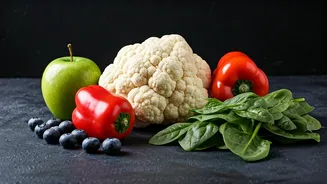Kidney Health Basics
The kidneys are vital organs, performing the crucial task of filtering waste and excess fluids from the blood. They also regulate blood pressure, produce
hormones essential for red blood cell production, and keep bones healthy. Maintaining kidney health is critical for overall well-being. Poor kidney function can lead to a buildup of toxins in the body, causing various health problems. Dietary choices play a significant role in kidney health, and incorporating foods known for their cleansing properties can significantly aid in kidney function. Selecting the right foods helps support the kidneys' natural ability to filter waste, balance fluids, and maintain essential bodily functions. Understanding the importance of these cleansing foods is the first step towards proactive kidney care and overall health maintenance.
Watermelon's Hydrating Power
Watermelon, a refreshing fruit, is an excellent choice for kidney health due to its high water content. This helps flush out waste and keeps the kidneys well-hydrated, which is essential for their proper function. Watermelon is also a source of antioxidants, such as lycopene and vitamin C, that protect the kidneys from damage caused by free radicals. The fruit's low potassium content makes it a safe option for individuals with kidney issues, preventing the accumulation of potassium that can be harmful. Eating watermelon not only satisfies your sweet cravings but also provides the body with essential hydration and protective antioxidants, making it a simple yet effective addition to a kidney-friendly diet. Incorporating it into meals or enjoying it as a snack provides a refreshing and beneficial boost for kidney function.
Lemon's Detoxifying Benefits
Lemons are renowned for their detoxifying properties, making them an invaluable ally for kidney health. The citric acid in lemons helps prevent the formation of kidney stones by binding with calcium in the urine. Regular consumption of lemon juice or adding lemon to water aids in breaking down and flushing out calcium oxalate stones, a common type of kidney stone. Moreover, lemon's acidic nature alkalizes the body, which can reduce inflammation and help create a balanced internal environment. Drinking lemon water regularly can also improve hydration, a critical factor in kidney health. Using lemons daily is an easy and effective way to boost your kidney's ability to filter and eliminate waste, therefore increasing the overall well-being.
Garlic's Anti-inflammatory Action
Garlic is a powerhouse of health benefits, including its potent anti-inflammatory properties that are very useful for kidney health. Compounds in garlic, especially allicin, have been found to reduce inflammation, which is a common factor in kidney diseases. By reducing inflammation, garlic can help improve kidney function and potentially slow the progression of kidney damage. Garlic's antioxidant qualities also protect kidney cells from free radical damage, preserving their structural integrity. Regular consumption of garlic, whether in cooked dishes or raw form, can significantly contribute to supporting kidney health. The use of garlic can provide a simple way to support kidney function and overall well-being.
Turmeric’s Healing Properties
Turmeric, a golden spice, is known for its powerful anti-inflammatory and antioxidant effects, vital for kidney health. Curcumin, the active compound in turmeric, has been shown to protect the kidneys from damage by reducing inflammation and fighting oxidative stress. It also aids in promoting kidney function by reducing the accumulation of toxins in the kidneys. Moreover, turmeric can have a protective effect on the kidneys from chronic kidney diseases. Including turmeric in your diet, either through cooking or supplements, can be a simple yet effective way to enhance kidney health and support the body's detoxification processes. The consistent use of turmeric can provide long-term benefits for kidney function and overall health.
Kidney-Friendly Diet Overview
While the foods mentioned above are beneficial, a comprehensive kidney-friendly diet involves more than just including specific items. Reducing sodium intake, avoiding processed foods, and limiting the consumption of red meat can significantly reduce the load on the kidneys. Staying well-hydrated, typically by drinking an adequate amount of water daily, helps maintain the kidneys' filtering capacity. Consulting a healthcare provider or a registered dietitian can provide personalized dietary advice tailored to specific needs. A holistic approach to nutrition, combining the foods mentioned with other healthy habits, can result in improved kidney function and overall health. By adopting these practices, you can optimize kidney health and enhance overall wellness.



















